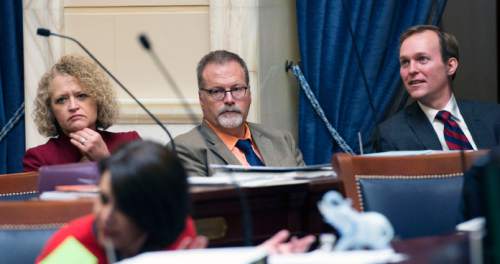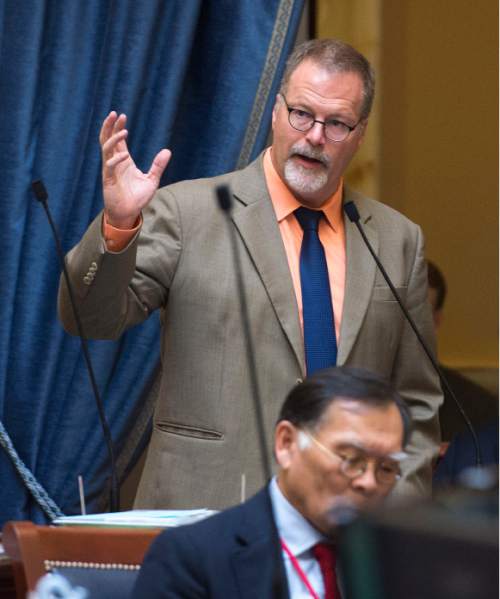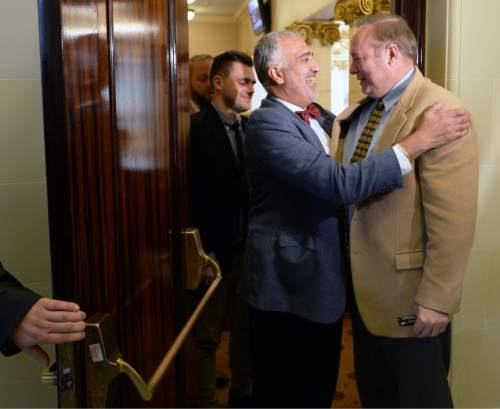This is an archived article that was published on sltrib.com in 2016, and information in the article may be outdated. It is provided only for personal research purposes and may not be reprinted.
The Senate gave preliminary approval on Friday to a bill that would toughen Utah's hate-crimes laws, by bumping up the punishments for those who commit bias-motivated offenses,
SB107 passed on a 17-12 vote after an hour of debate, although some supporters said they may switch their position when the measure comes up for a final Senate vote next week.
Friday's success came despite pressure from The Church of Jesus Christ of Latter-day Saints, which last week warned state lawmakers not to pass bills that would upset the balance between gay rights and religious liberties achieved in legislation last year.
"The LDS Church's statement really took votes away from this bill," SB107's sponsor, Sen. Steve Urquhart, R-St. George, said after the vote, adding that a broad coalition supports the proposal, including many churches.
"The LDS Church is the only church against this legislation, but it is the dominant religion," Urquhart, a Mormon, said. "When it speaks, legislators do listen."
Last year, LDS officials, state lawmakers and rights activists worked together to pass a statewide nondiscrimination law that protects Utah's lesbian, gay, bisexual and transgender community in housing and employment, while offering exemptions for churches and protecting individuals' religious freedom.
SB107 would add heft to Utah's existing hate-crimes law by allowing prosecutors to increase by one step felony and misdemeanor criminal charges for acts motivated by bias. That would mean, for example, that a third-degree felony could be increased to a second-degree felony, which automatically carries a stiffer punishment.
Current law limits such sentencing enhancements to misdemeanor crimes.
The bill also contains a definition for hate crimes — something current law lacks — and includes a list of protected classes, including "ancestry, disability, ethnicity, gender, gender identity, national origin, race, religion or sexual orientation."
In the past, Utah lawmakers have balked at such classifications, objecting to the idea of protected classes in general and the specific inclusion of "sexual orientation."
The LDS Church in past years had issued statements declaring the faith did not oppose such legislation.
This week, in response to an inquiry from The Salt Lake Tribune, the church declined to comment on whether that position had changed.
The issue was raised again Friday, with Sen. Todd Weiler, R-Woods Cross, asking about the need to specifically define some groups, but leave others out. For example, Weiler said, if he were attacked because he was obese, wearing Brigham Young University colors or because he likes musicians Justin Bieber or Taylor Swift, he would not be protected.
"But if they think I'm transgender, under this bill, then this hate-crimes statute would be invoked," he said. "How is that equal? Because to me that smacks as if it were a special status."
The classifications, Urquhart said, acknowledge real-world concerns.
"The reality is that [members of] certain groups are attacked because they belong to that group," said Urquhart, "whether it's black, whether it's white, whether it's Mormon, whether it's Jewish."
Prosecutors, he said, should have the ability to determine whether any attack is motivated by bias and whether it carries the intent of terrorizing a wider community.
Weiler might be protected if an attack on him was motivated by someone's dislike of BYU as a religious institution, Urquhart said.
He also noted that lawmakers already enjoy special legal protections under the law.
"We have given ourselves enhanced protection, deeming ourselves worthy of that," he said. "An attack on us, because we're public officials, would receive a one-level bump."
Other questions about the bill focused on whether SB107 would criminalize thoughts or speech. The bill doesn't address the issue, but a companion resolution — SJR13, which passed unanimously — protects both free speech and association by setting evidence standards for prosecutors.
In the hall outside the Senate after both votes, Urquhart acknowledged there is considerable work ahead in the Senate and the House.
"I surely don't want to bet against myself," he said. "But I would need to perform some serious magic to get it through the process now that the [Mormon] church has spoken."
SB107 backers who filled the Senate gallery Friday celebrated the day's victory with hugs and expressions of optimism. Among them were Maxwell Christen and Rusty Andrade, two gay men who were jumped and beaten outside their downtown Salt Lake City homes in December 2014. The inability of Salt Lake County prosecutors to file criminal charges against the crime's perpetrators has in part motivated Urquhart's effort.
"This isn't about us. It's really about the rest of the state," said Andrade. "It won't change the outcomes for the people who committed crimes against us. But for the people who come behind, or the people who don't have an opportunity to speak up, this is why the bill matters."
Twitter: @jenniferdobner







